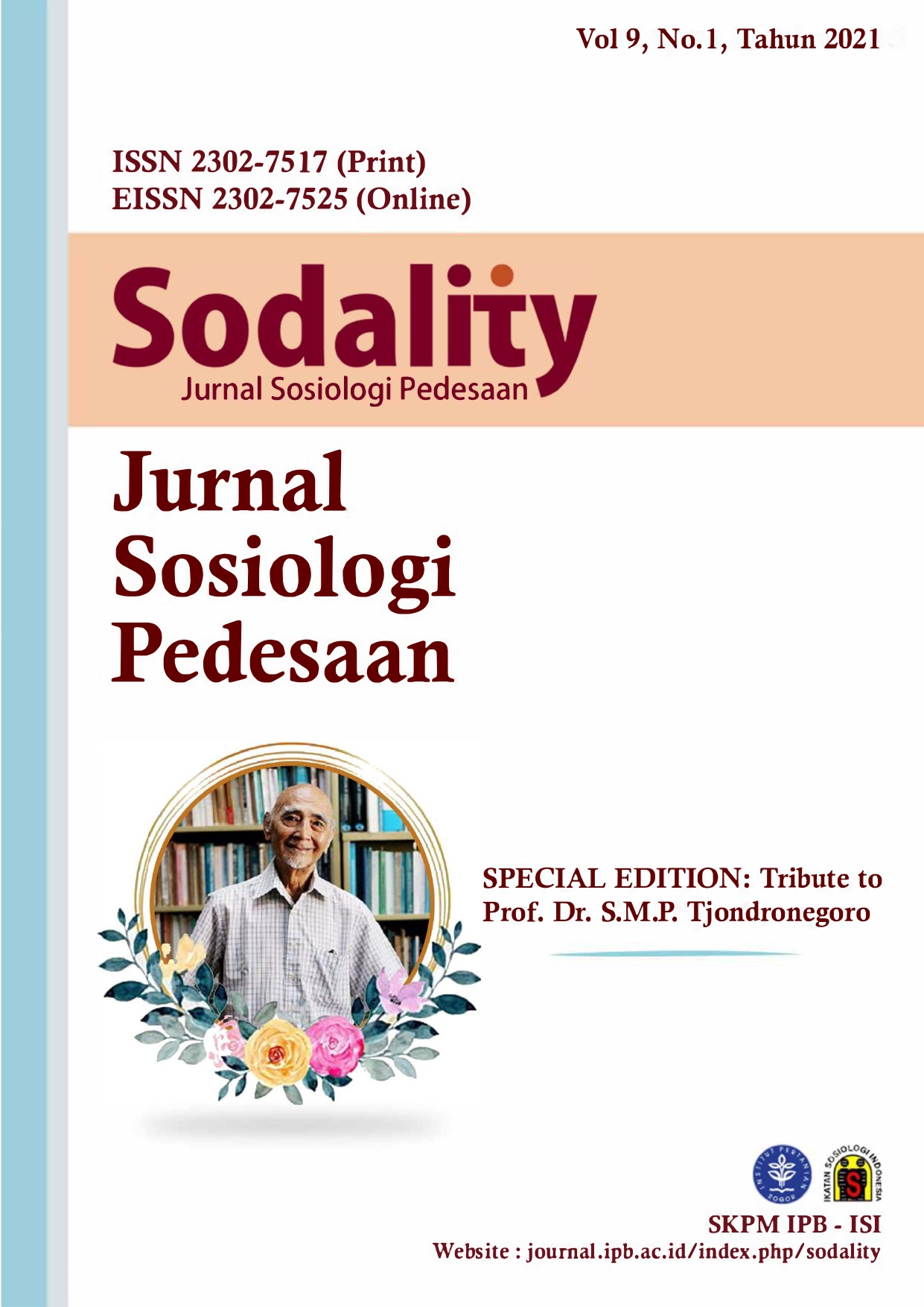Villages and Peasant Households under Development: Contextualizing S.M.P. Tjondronegoro's Concept about Sodality in Agroecology
Abstract
This article attempts to contextualize the concept brought forward by S.M.P. Tjondronegoro regarding rural social organization under development. The framework used by Tjondronegoro makes it possible to re-open the discussion on villages and peasants from the point of view of peasant household economic theory. The central question of this discussion remains similar to Tjondronegoro's previous concern, such as the participation of rural communities under development. These two approaches touch the basic theory that views participation from different angles. By using the concept of sodality as a cultural mediation space, where cultural agroecology is seen as a representation of the agency and actions of peasants, the issue of participation in rural development can be seen more broadly. This effort places Tjondronegoro's concept within the spectrum of agroecological science and movement.
References
Appadurai, A. (1996). Modernity at Large. University of Minnesota Press.
Arudsothy, P. (1986). Review of Social Organization and Planned Development in Rural Java by Sediono M.P. Tjondronegoro. Contemporary Southeast Asia, 8(2), 173–175. https://www.jstor.org/stable/25797897
Francis, C., Lieblein, G., Gliessman, S., Breland, T. A., Creamer, N., Harwood, R., Salomonsson, L., Helenius, J., Rickerl, D., Salvador, R., Wiedenhoeft, M., Simmons, S., Allen, P., Altieri, M., Flora, C., & Poincelot, R. (2003). Agroecology: The Ecology of Food Systems. Journal of Sustainable Agriculture, 22(3), 99–118. https://doi.org/10.1300/J064v22n03_10
Geertz, C. (1963). Agricultural Involution The Processes of Ecological Change in Indonesia. University of California Press.
Gliessman, S. R. (1997). Agroecology: Ecological Processes in Sustainable Agriculture. Lewis Publishers.
Gliessman, S. R. (2015). Agroecology: The Ecology of Sustainable Food Systems. CRC Press.
Mills, C. W. (2000). The Sociological Imagination. Oxford University Press.
Reuter, T. (2019). Understanding Food System Resilience in Bali, Indonesia: A Moral Economy Approach. Culture, Agriculture, Food and Environment, 41(1), 4–14. https://doi.org/10.1111/cuag.12135
Rosset, P. M., & Altieri, M. A. (2017). Agroecology: Science and Politics. Fernwood Publishing.
Rosset, P. M., Val, V., Barbosa, L. P., & McCune, N. (2019). Agroecology and La Via Campesina II. Peasant Agroecology Schools and the Formation of a Sociohistorical and Political Subject. Agroecology and Sustainable Food Systems, 43(7–8), 895–914. https://doi.org/10.1080/21683565.2019.1617222
Schweizer, M. (1983). Religion and Social Stratification in a Santri Village in Klaten, Central Java. Indonesia Circle. School of Oriental & African Studies. Newsletter, 11(32), 25–34. https://doi.org/10.1080/03062848308729563
Scoones, I. (2015). Sustainable Livelihood and Rural Developments. Practical Action Publishing.
Scott, J. C. (1977). The Moral Economy of the Peasant: Rebellion and Subsistence in Southeast Asia. Yale University Press.
Stoler, A. (1978). Garden Use and Household Economy in Rural Java. Bulletin of Indonesian Economic Studies, 14(2), 85–101. https://doi.org/10.1080/00074917812331333331
Tjondronegoro, S. M. P. (1978). Recent Indonesian Rural Development: Dilemma of a Top-Down Approach. Southeast Asian Affairs, 139–148. http://www.jstor.org/stable/27908342
Tjondronegoro, S. M. P. (1984). Social Organization and Planned Development in Rural Java: A Study of the Organizational Phenomenon in Kecamatan Cibadak, West Java and Kecamatan Kendal, Central Java. Oxford University Press.
Tjondronegoro, S. M. P., & Wiradi, G. (Eds.). (1984). Dua Abad Penguasaan Tanah: Pola Penguasaan Tanah Pertanian di Jawa dari Masa ke Masa. Gramedia.
Val, V., Rosset, P. M., Zamora Lomelí, C., Giraldo, O. F., & Rocheleau, D. (2019). Agroecology and La Via Campesina I. The Symbolic and Material Construction of Agroecology through the Dispositive of “Peasant-to-Peasant” Processes. Agroecology and Sustainable Food Systems, 43(7–8), 872–894. https://doi.org/10.1080/21683565.2019.1600099
Van der Ploeg, J. D. (2009). The New Peasantries: Struggles for Autonomy and Sustainability in an Era of Empire and Globalization. Earthscan.
van Ufford, P. Q. (1985). Review of Social Organization and Planned Development in Rural Java by Sediono M.P. Tjondronegoro. Man, 20(4), 778–779. https://doi.org/10.2307/2802799
Wezel, A., & Soldat, V. (2009). A Quantitative and Qualitative Historical Analysis of the Scientific Discipline of Agroecology. International Journal of Agricultural Sustainability, 7(1), 3–18. https://doi.org/10.3763/ijas.2009.0400
White, B. (1976). Production and Reproduction in a Javanese Village. Columbia University.
White, B. (1983). “Agricultural involution” and its Critics: Twenty Years After. Bulletin of Concerned Asian Scholars, 15(2), 18–31. https://doi.org/10.1080/14672715.1983.10404871
White, B. (2017). The Myth of the Harmonious Village. Inside Indonesia. https://www.insideindonesia.org/the-myth-of-the-harmonious-village-2
White, B. (2018). Marx and Chayanov at the Margins: Understanding Agrarian Change in Java. The Journal of Peasant Studies, 45(5–6), 1108–1126. https://doi.org/10.1080/03066150.2017.1419191
White, B. (2020). ‘Problems in the Empirical Analysis of Agrarian Differentiation Processes’: A Reflection. https://www.aqs.org.uk/problems-in-the-empirical-analysis-of-agrarian-differentiation-processes-a-reflection/
Authors who publish with this journal agree to the following terms:
- Authors retain copyright and grant the journal right of first publication with the work simultaneously licensed under a

This work is licensed under a Creative Commons Attribution 4.0 International License. that allows others to share the work with an acknowledgement of the work's authorship and initial publication in this journal. - Authors are able to enter into separate, additional contractual arrangements for the non-exclusive distribution of the journal's published version of the work (e.g., post it to an institutional repository or publish it in a book), with an acknowledgement of its initial publication in this journal.
- Authors are permitted and encouraged to post their work online (e.g., in institutional repositories or on their website) prior to and during the submission process, as it can lead to productive exchanges, as well as earlier and greater citation of published work (See The Effect of Open Access).





.png)









